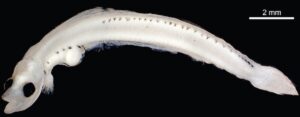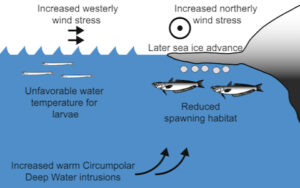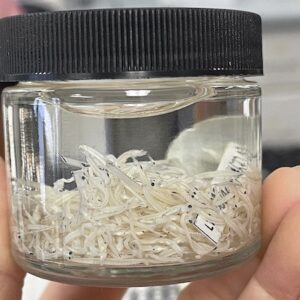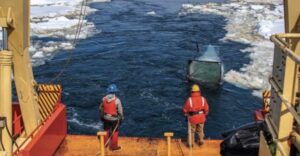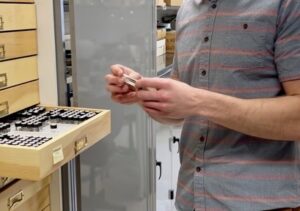
Study Suggest Antarctic Ecosystem in Danger
A new challenge now faces Antarctica. One that is causing warming waters, melting of ice and most importantly, a decline in Antarctic Silverfish.
The Antarctic Silverfish is a species of ray-finned herring located in the Southern Ocean.`
The Antarctic Silverfish is a main part of the ecosystem in the Arctic. They contribute to the diets of seals, penguins, other large fish and a lot of other animals in the area. They make up about 90% of fish biomass in the Southern Ocean. They play a similar role as sardines or anchovies in more warm areas.
An increase in average temperatures in the region has led to the water of the area warming. The warming waters have a direct effect on the ice in the area, causing a large chunk of it to melt.
This poses many issues on its own such as rising sea levels, but a new survey shows the loss of ice is ruining the Antarctic Silverfish’s way of reproducing.
The fish put their larval into the ice walls which allows for a natural nursery. When there is less ice it creates more competition for the fish to get the best spots, thus hurting the species as a whole and decreasing their numbers.
The loss of ice also increases the amount of wind hitting from the west and north. With more wind the waves are getting bigger. The bigger waves are creating more movement which is also heating up the entire body of water.
The warming waters are also taking a toll on the fish. They have adapted to survive only in the cold waters of the Southern Ocean, now that water temperature is rising higher than they are prone to survive in.
The study on the current situation of the wildlife was conducted by three different authors, Deborah Steinberg and Eric Hilton of VIMS, along with Sharon Stammerjohn of the Institute of Arctic and Alpine Research at the University of Colorado, Boulder.
The study was conducted based on research by Andrew Corso, a doctoral candidate at William & Mary’s Virginia Institute of Marine Science.
The study is based on more than 7,000 larval fish collected over the course of 25 years as part of VIMS’ participation in the NSF-funded Palmer Antarctica Long-Term Ecological Research program. The program is designed to watch the ecosystem within the Southern Ocean.
The research was designed to show what was needed in order to have the larval produced and what temperature was needed to keep the fish alive in the water. It was shown the fish need to have the water at least less than 1.7 degrees °C and large chunks of ice in order to have large deposits of eggs, and to keep the larval safe in early life stages.
“The effect of water warming could be extremely dangerous to the food chain in the Antarctic,” Steinberg said. “Though we should not have to have a food chain emergencency to be springing into action on warming.”
Steinberg said that the problem may seem like it is just affecting some faraway land, but the global impacts can affect everyone. They stressed how one ecosystem being damaged can cause a ripple effect, hurting all of them.
Hilton discussed how the environment has changed over the 25 year study. He said that since the start of the study, the average temperature of the area has risen by 10 degrees fahrenheit.
“The damage we have done to these silverfish may be irreversible, I hope that is not the case but it is possible. It is important to try and reverse some of this damage done in order to cool the water to try and save other species of fish,” Steinberg said.
“The damage we have done to these silverfish may be irreversible”
Author deborah steinberg
The land that is 9,000 miles away may seem far, but the impact on this area can affect everyone. If the ice the fish keeps their babies in melts too much, water levels will rise very high. The rising sea levels can eventually cause coastal cities to be sunken, and push humanity inward.
“This study does not surprise me,” biology professor Allyson Tessin said. “That area is in danger and we need to take any sort of precautions we can to make it better.”
Tessin stressed about the importance of the specific contributors in the food chain.
“Think about if all of sudden there were no more ants. No more ants would mean there are no more spiders, no more spiders would mean no more food for birds and so on. The chain would be broken,” Tessin said.
“When we focus specifically on those fish, we could lose penguins and seals and a bunch of other things. Imagine a world without those animals. We need to do what we can to keep global warming at bay for our future generations,” Tessin said.
“We need to do what we can to keep global warming at bay for our future generations”
Biology professor Allyson Tessin
There are ways that the average person can help this land that seems so far away.
“There are a ton of ways that the average person can help with water warming. It is part of global warming so it’s the same ways to combat it,” Eric Hilton said. “So watching your carbon footprint, walking instead of riding a car when you can, cities should start looking to use solar or wind power, things like that.”
“A big thing that is a little more unique to this situation is limiting the number of fish that we eat,” Hilton said. “When we catch fish for eating so many things get caught in those nets, this includes animals and other fish we aren’t even trying to catch. These fish are already dealing with climate change, they do not need nets taking them out too.”
Anything you do can help give these fish a better chance of survival, and has the power to save a delicate ecosystem.
“We all can have a role to play in this,” Hilton said. “Everyone is able to do their part and try to make sure we do not lose one of Earth’s ecosystems. We need to save what we can before it is too late.”
“We need to save what we can before it is too late”
Author Eric Hilton
